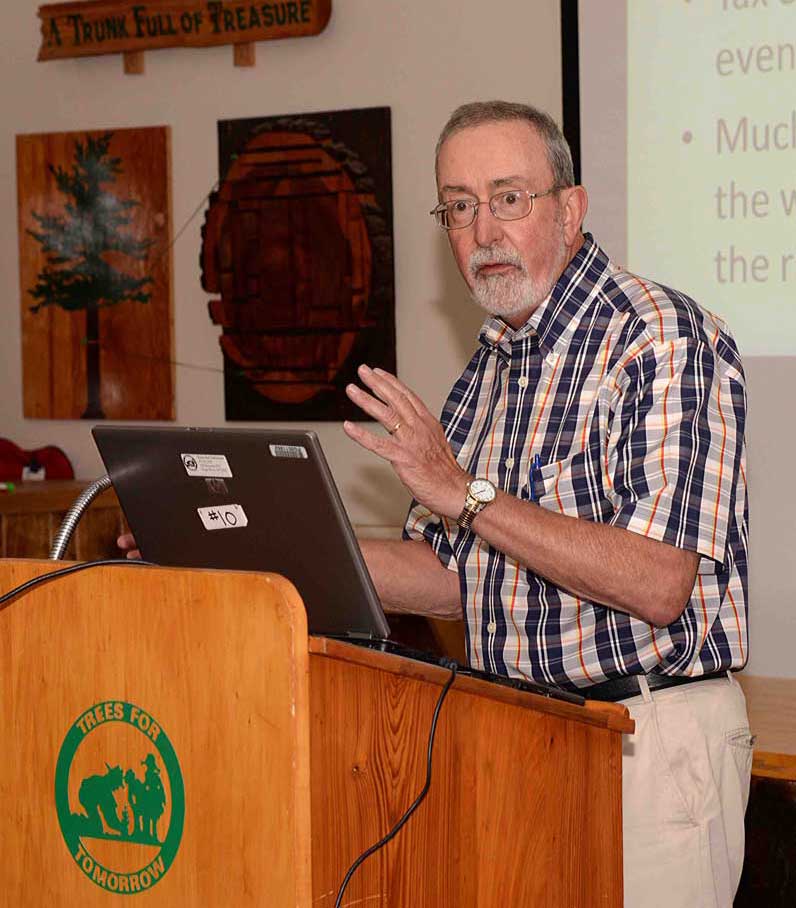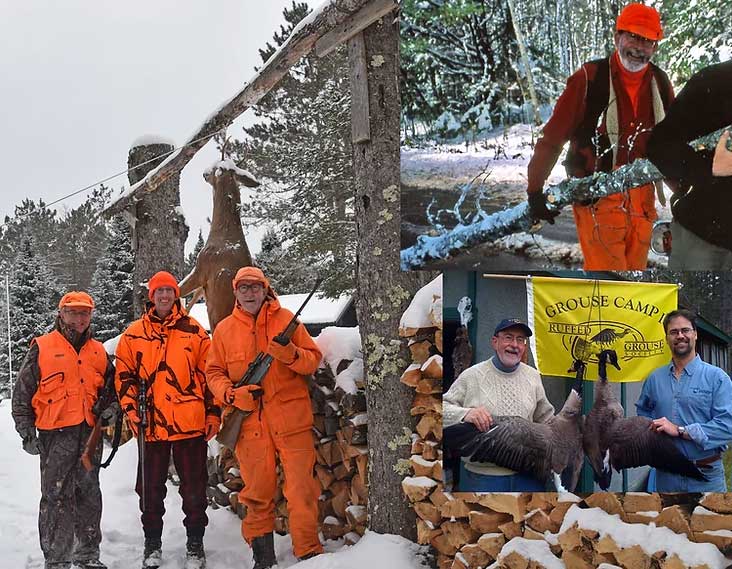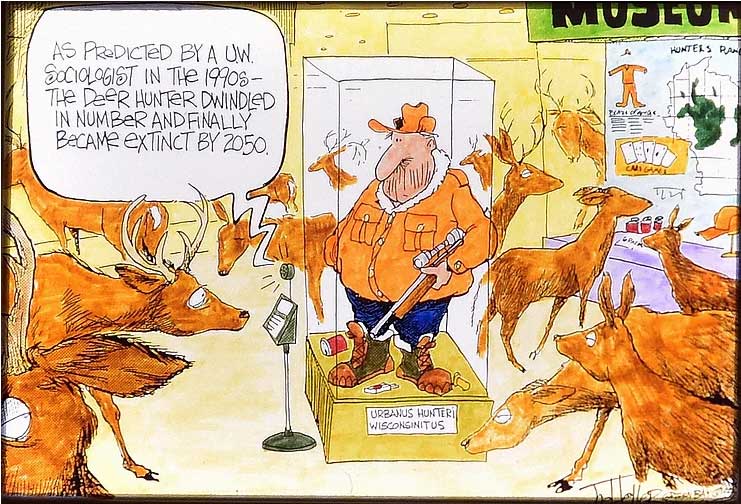
Thomas A. Heberlein, Professor Emeritus in the Department of Community and Environmental Sociology at the University of Wisconsin, Madison and Visiting Professor in the Department of Wildlife, Fish and Environmental Studies at the Swedish University of Agricultural Sciences, died early January 4, 2024 with his wife, Betty, at his side.
He was a frequent speaker at WOCA workshops (shown in 2014) and a mentor to countless DNR staff. Information about funeral arrangements is not available at this time. If you wish to send condolences to his wife, contact Laurel Steffes for an address.
Famed Professor Tom Heberlein Hunted Old T till the End
Written by WOCA President, Patrick Durkin
Featured on his Web site, Patrick Durkin Outdoors
Professor Tom Heberlein was forever vigilant about his deer camp’s buckpole, even though it hung empty more often than heavy each November.
When hunting grouse in October, Heberlein often paused outside his Ashland County shack, cracked his double-barreled 20-gauge, and eyed the buckpole lashed to the big spruces bordering the camp’s driveway.
A detail-conscious man, the professor replaced the buckpole every decade or so when it looked too weak to bear a dead buck’s burden. Heberlein required buckpoles to match his optimism and stand just as stout should the Old Tamarack Camp hoist a buck during Wisconsin’s upcoming gun season.
Therefore, Heberlein’s hunting buddies traded wary glances when returning to Old T from the Ashland hospital on Nov. 20, Monday afternoon of the 2023 deer season. The buckpole was down, a rotted chunk dangling askew from a heavy rope, the rest broken on firewood stacked below.
Odd. They could’ve sworn the buckpole was intact late that morning when leaving to visit Heberlein in his hospital room.
They recognized the portent, but didn’t voice it.
Their denials did no good. On Jan. 4, 2024, Thomas A. Heberlein, professor emeritus at the University of Wisconsin-Madison, and owner and captain of Old T’s hunting shack and 40 acres, died shortly after 2 a.m. at age 78.
Heberlein was a world-renowned professor of rural sociology. He regularly studied the American hunter, hunting’s demographics, and hunters’ attitudes and behaviors. His relentless work ethic generated a 21-page listing of his peer-reviewed academic research papers, guest editorials in Madison and Milwaukee newspapers on statewide conservation issues, and a career-capping book, “Navigating Environmental Attitudes,” which every teacher, hunter, politician, angler and outdoors-person should read.
Professor Bob Holsman, who taught at UW-Stevens Point and worked as a human-dimensions researcher for the Department of Natural Resources, said Heberlein was a “true pioneer” in his field. Holsman describes Heberlein’s research as more “creative, rigorous and applicable” than studies by other titans of human-dimensions research. That’s why Holsman made Heberlein’s book required reading for his UW-SP classes after its 2012 publication by the Oxford University Press.
Heberlein’s former students at UW-Madison, where he taught from 1972 to 2001, said he was fun, feared and respected. One such student was Professor Christine Thomas, who served 16 years as dean of the College of Natural Resources at UW-SP. Thomas earned her Ph.D. in natural resources policy and management at UW-Madison, and knew the stress of Heberlein’s questions and critiques.
“He was the guy I was most afraid of, but he turned out to be my champion,” Thomas recalled.
Heberlein’s work and opinions often drew media attention, which led to countless articles in print and online, and guest appearances on TV and radio. Perhaps his most famous moments came in 1992 after he and his wife, Professor Elizabeth Thomson, published research on a predicted decline in the nation’s hunting population, and how it would trigger funding challenges for state wildlife-management programs. Heberlein said our hunting culture of the late 1900s would differ greatly or largely perish by 2050, replaced by higher license fees paid by a much smaller, but more affluent hunting population.
His prediction sparked newspaper and magazine articles nationwide, including a widely shared cartoon by Joe Heller at the Green Bay Press-Gazette. Heller’s cartoon showed a deer herd wandering through a museum exhibit featuring a paunchy, orange-clad hunter encased in glass, and identified as “Urbanis Hunteri Wisconsinitus.” The cartoon’s caption read: “As predicted by a U.W. sociologist in the 1990s, the deer hunter dwindled in number and finally became extinct by 2050.”
Well, that date is now 26 years away, and Wisconsin’s deer hunting population has fallen significantly. The state sold a record 699,275 gun-deer licenses in 1990, and about 554,500 in 2023, a 21% decline.
Heberlein, however, wasn’t among those dropouts. He first hunted deer at Old T with his father and uncles in the 1960s, and returned every gun season through the November 2023 opener.
Despite his devotion to deer camp, Heberlein never considered himself a serious deer hunter. His intrigue laid more with ruffed grouse, woodcock, waterfowl and wild turkeys. Likewise, though he owned an old Winchester lever-action .32 Special and Remington pump-action .30-06, his heart and mind entwined with bird dogs, clay pigeons, and side-by-side 12- and 20-gauge shotguns.
That’s why Heberlein and his bird-hunting friends gathered often at Old T in October. They waited till the maples and poplars shed their red and yellow leaves, about the time tamaracks turned from dark green to smoky gold. During October 2009’s grouse camp, Heberlein and his longtime friend Rich Stedman found themselves working through a twiggy nightmare of poplar saplings. As they neared a pond on Old T’s 40, they heard Canada geese on the rippled water, murmuring among themselves.
The hunters paused and retreated to the shack, where Heberlein swapped his upland ammo for steel pellets. After crafting a plan and hastening back, Heberlein hid among the spruce and balsams on the pond’s northeastern corner. There he waited for Stedman to crest the pond’s southern berm and flush the five honkers.
The geese took flight into the breeze, directly toward the professor. Heberlein stood when they flew into range, and dropped the lead goose with his first shot and the third goose with his second. Then he sighed with relief. At age 64, the “old guy” hadn’t lost his shooting eye.
But time marched on, slowly tiring the professor’s eyes and body. During the October 2023 grouse camp, a member returned to Old T at midmorning. Heberlein sat snoozing in the sun beside the shack, slumped but upright on his Leopold bench. The friend left the professor to his rest and silently recalled a few lines by W.B. Yeats:
“His eyelids drop his head falls low,
“His old eyes cloud with dreams,
“The sun upon all things that grow,
“Falls in sleepy dreams.”
Six weeks later, the day before deer season, Heberlein returned to camp with his grandson, Peter Hilton; and Chris White of Ohio, an Old T stalwart. Hilton and White hiked into the forest the next dawn to hunt deer. Strength permitting, Heberlein would hunt his nearby box stand.
But his strength never rallied. Heberlein couldn’t lift himself from his narrow bunk in the shack’s “Captain’s Quarters.” When Hilton returned at dusk to find his grandfather still in his sleeping bag, he helped him dress for a drive to the hospital.
A week later, Heberlein returned to die in his Madison home, never again to hunt Old T or replace its buckpole.
Sigh.
Thanks, Tom Heberlein, for your friendship, and your well-studied insights into hunters, hunting and human bonds.
We’ll listen for the grouse’s flush and your shotgun’s blast as the balsam boughs close silently behind you.

